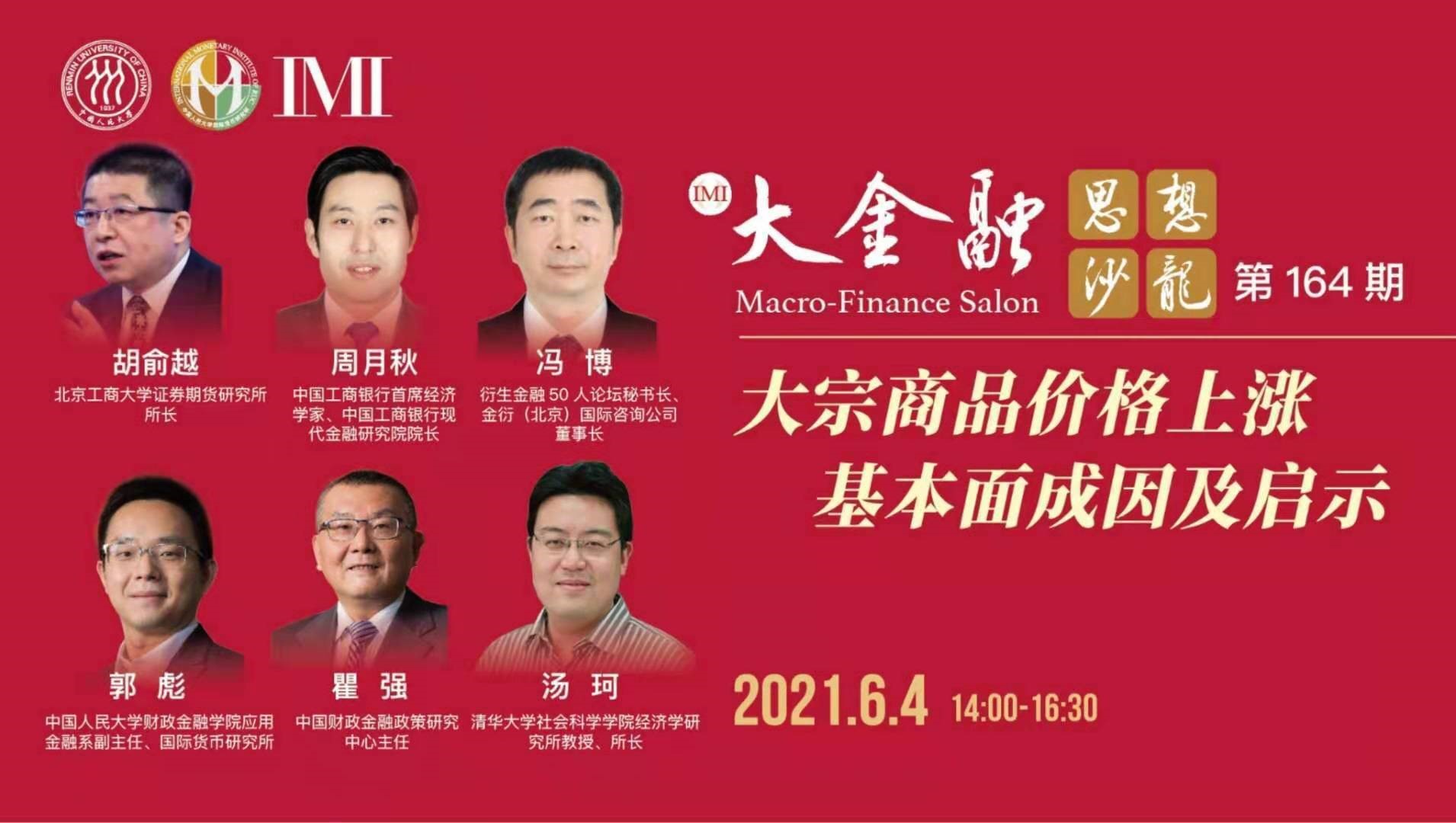Macro-Finance Salon (No. 164): Fundamental Causes of Rising Commodity Prices and Lessons Drawn from It
2021-06-04 IMI
On June 4, the Macro-Finance Salon (No. 164) was held by the International Monetary Institute (IMI) and the Department of Monetary Finance, School of Finance, Renmin University of China (RUC). Guo Biao, Deputy Director of the Department of Applied Finance, the School of Finance, RUC and Researcher of the IMI, delivered a report entitled “Fundamental Causes of Rising Commodity Prices and Lessons Drawn from It”. The seminar was chaired by Qu Qiang, Researcher and Assistant to Director of the IMI, RUC and Feng Bo, Secretary-General of the China Derivatives 50 Forum and Chairman of Jin Yan (Beijing) International Consulting Co., Ltd., Hu Yuyue, Director of the Securities and Futures Research Institute of Beijing Technology and Business University, and Tang Ke, Professor and Director of the Institute of Economics, School of Social Sciences, Tsinghua University made perceptive comments on the report.
The seminar started with a report delivered by Professor Guo Biao entitled “Fundamental Causes of Rising Commodity Prices and Lessons Drawn from It”. The report analyses the factors behind the rising commodity prices with macro factors being the supply and demand gap caused by the pandemic, monetary easing of US dollars coupled with fiscal stimulus, short-term impact of carbon neutrality policies and etc.
In terms of micro factors, ten commonly used factors of Bull and Bear Index (BBI) are tracked in China's commodity market to establish a theoretical framework for the report. Analyses of fundamentals show that the producer prices of needed raw materials for downstream industries are at historically high levels, driving up the commodity prices. Therefore, a basic conclusion can be drawn by combining analyses of both macro and micro factors—something is amiss on the supply side. After summarizing the lessons learned this time, the report also offers suggestions, including improving the price discovery mechanism in derivatives market, developing basis trading, increasing elasticity of supply; leveraging RMB to adjust exchange rate and demanding Exchanges to keep a close eye on the market trend before the dominant contracts expire.
Based the report, Professor Hu Yuyue talked about his research and views on the rising commodity prices. First, this round of price spike, he believes, is caused by changes in economic fundamentals and excessive liquidity. If tensions between supply and demand in economic fundamentals cannot be solved effectively in the short term or in the future, the tide will not be turned. Second, there is no need to worry too much about the price increase spilling over to downstream industries. For example, the fall in pork prices has kept the CPI low.
Professor Tang Ke shared his understanding from the following four aspects. First, regarding the financialized commodity markets, he pointed out that three attributes determine the prices of commodities: supply, demand and finance. Second, in contrast to the soaring PPI, the rise of CPI is less sharp. An important reason is that upstream companies actually bear the brunt of price fluctuation. Third, in terms of the duration of the price spike, he maintains that fundamental factors are more at play, meaning that prices will not return to normal very soon. Fourth, he stressed that in the face of imported inflation risks brought by commodities and without the intervention of monetary policies, we should suit the remedy to the case by taking targeted measures and introducing a package of polices.
Feng Bo, Chairman of Jinye Company, pointed out that in recent years, researchers are more inclined to hold that moderate inflation supports economic development, and the public are less vigilant about inflation. However, the rise of commodity prices this time is not indicative of a moderate inflation, but a vicious one. Thanks to the timely measures taken by the two executive meetings of the State Council, the curve of the price rise has been flattened. Marketwise, we should respect market rules. Currently, it is imperative for industrial enterprises to stabilize the price to ensure production, whereas the futures market, to better serve the real economy, should leverage the over-the-counter market (OTC market) of bulk commodities to provide industries with one-to-one services.
